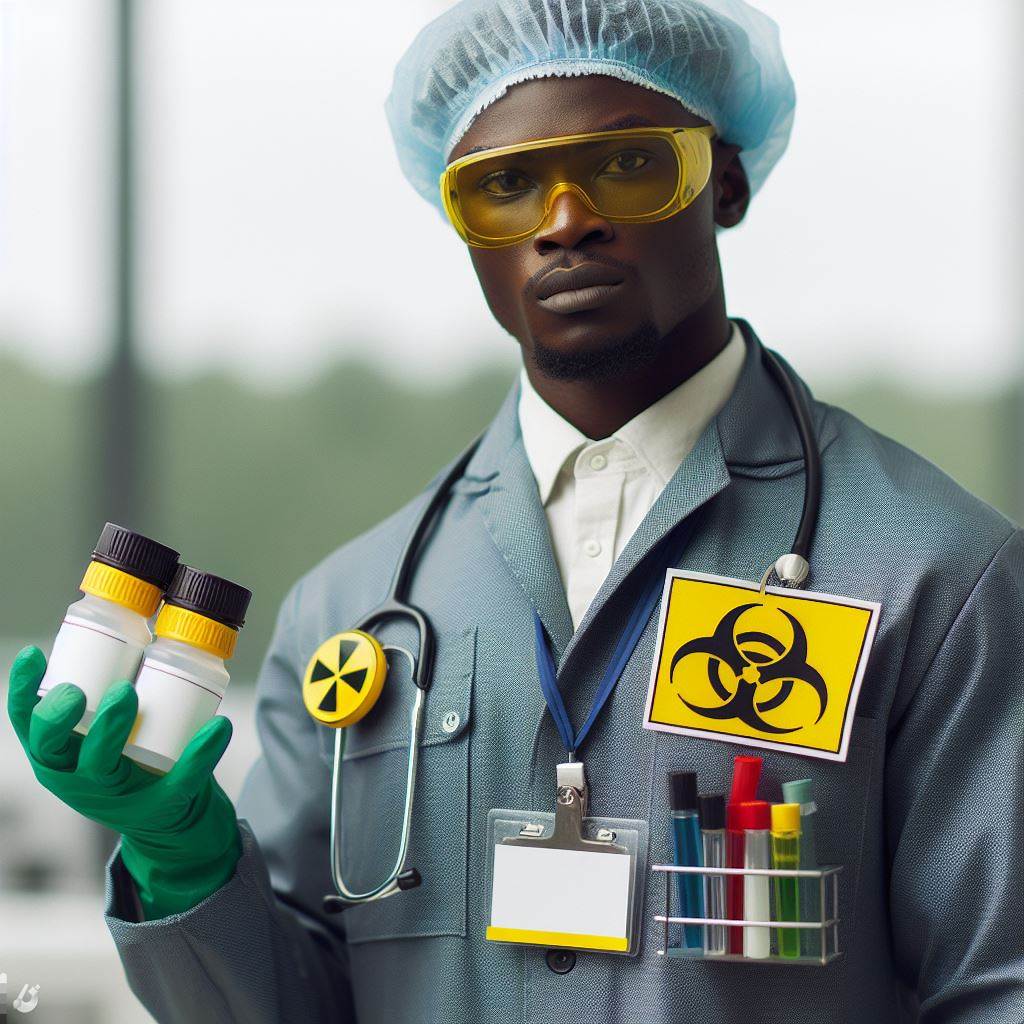Introduction
Toxicology, the study of harmful effects of chemicals, plays a pivotal role in safeguarding human health.
This chapter delves into comparing Nigerian toxicology curriculums with global standards.
Understanding toxic substances’ impact on living organisms is paramount for public health.
We’ll scrutinize course structures, core subjects, and practical exposure in toxicology education.
Nigeria’s toxicology curriculum traditionally aligns with international standards but lacks comprehensive practical training.
Comparatively, global curriculums integrate advanced research, diverse case studies, and interdisciplinary approaches.
The blog will unravel how Nigerian institutions can enhance their curriculum for comprehensive toxicology education.
Global programs often emphasize analytical techniques, environmental toxicology, and regulatory frameworks.
Contrastingly, Nigerian courses focus more on foundational theories and basic toxicology principles.
This discussion aims to foster improvements in Nigerian toxicology education to meet global benchmarks.
The disparity lies in practical exposure, research-oriented projects, and collaboration with industry experts.
The emphasis on indigenous toxicants and regional challenges stands out in the Nigerian curriculum.
However, global programs showcase a broader spectrum, encompassing varied toxicological scenarios and solutions.
By examining these variations, we aim to promote advancements and bridge the gap in toxicology education.
The subsequent sections will delve deeper into specific components, highlighting strengths and areas for improvement.
This exploration aims to elevate Nigerian toxicology education to international standards, fostering academic excellence.
Overview of Toxicology Curriculums
A toxicology curriculum refers to the specific set of courses and educational materials designed to provide students with comprehensive knowledge and understanding of toxicology studies.
Definition of curriculum in the context of toxicology studies
Curriculum in toxicology studies refers to the structured educational plan that outlines the courses and topics covered in the field.
It includes a wide range of subjects such as pharmacology, chemistry, biology, environmental science, and risk assessment.
The curriculum aims to equip students with the necessary scientific background and analytical skills to study the harmful effects of chemicals and toxins on living organisms.
It provides students with a strong foundation in toxicological principles, including exposure assessment, mechanism of toxicity, and risk management.
The curriculum also focuses on the ethical implications and environmental impact of toxic substances.
It prepares students for careers in research, environmental consulting, regulatory agencies, and pharmaceutical industries.
The components typically included in toxicology curricula
Core Courses
Toxicology curricula typically include core courses that cover fundamental concepts and principles.
These courses provide students with a basic understanding of toxicology, including toxic agents, routes of exposure, and health effects.
Advanced Courses
Toxicology curricula often include advanced courses that delve deeper into specific areas of toxicology.
These courses may focus on topics such as toxicokinetics, toxicodynamics, and molecular mechanisms of toxicity.
Laboratory Training
Most toxicology curricula incorporate hands-on laboratory training to develop practical skills.
Students gain experience in sample collection, analytical methods, and data interpretation.
Seminars and Workshops
Toxicology curricula may include seminars and workshops conducted by experts.
These sessions provide opportunities for students to learn about current research, advancements, and emerging issues in toxicology.
Research Projects
Some toxicology curricula require students to undertake research projects.
These projects promote critical thinking, data analysis, and scientific writing skills.
Elective Courses
Toxicology curricula often offer a range of elective courses to specialize in specific areas.
Students can choose courses focusing on environmental toxicology, forensic toxicology, or clinical toxicology.
Fieldwork and Internships
Some toxicology curricula include fieldwork and internship opportunities.
Students gain practical experience by working in laboratories, environmental agencies, or toxicology research facilities.
Assessment and Evaluation
Toxicology curricula utilize various assessment methods, including exams, assignments, and laboratory reports.
Students’ performance is regularly evaluated to ensure mastery of toxicological concepts and skills.
In essence, toxicology curricula aim to provide students with a comprehensive understanding of the harmful effects of chemicals and toxins.
Transform Your Career with Expert Guidance
Get personalized mentorship consulting that’s tailored to your unique path. Our expert advice is actionable and exclusive.
Get StartedThese curricula cover a wide range of subjects and incorporate core courses, advanced courses, laboratory training, seminars, research projects, and elective courses.
Fieldwork and internships enhance practical skills, while regular assessment and evaluation ensure students’ mastery of toxicological principles.
By completing a toxicology curriculum, students are well-prepared for various careers in the field of toxicology.
Read: Why Nigeria Needs More Environmental Toxicologists
Nigerian Toxicology Curriculum
Recognition of toxicology as an emerging discipline in Nigeria
Over the years, toxicology has gained recognition as an important and emerging discipline in Nigeria.
Overview of toxicology curriculum in Nigerian universities
In Nigerian universities, the toxicology curriculum encompasses a wide range of courses to provide students with a comprehensive understanding of this field.
Core courses offered in Nigerian toxicology curriculums
- Introduction to Toxicology: This course introduces students to the basic principles and concepts of toxicology.
- Chemical Toxicology: Students learn about the toxic effects of various chemicals and their mechanisms of action.
- Environmental Toxicology: This course focuses on the study of toxins in the environment and their impact on living organisms.
- Pharmacology: Students gain an understanding of how drugs interact with living systems and their potential adverse effects.
- Risk Assessment: This course trains students to assess the potential risks associated with exposure to toxic substances.
- Toxicokinetics: Students learn about the absorption, distribution, metabolism, and elimination of toxic substances in the body.
Elective courses available to students
- Forensic Toxicology: This course focuses on the application of toxicology in legal investigations and criminal cases.
- Industrial Toxicology: Students learn about the hazards and toxicants present in occupational settings.
- Food Toxicology: This course explores the toxicological aspects of food contamination and foodborne illnesses.
- Toxicology Research Methods: Students learn various research methods and techniques used in toxicology studies.
- Clinical Toxicology: This course covers the diagnosis, treatment, and management of poisoning cases in a clinical setting.
Unique features or aspects of Nigerian toxicology curriculums
Nigerian toxicology curriculums have some unique features that distinguish them from global toxicology curriculums.
- The incorporation of traditional medicinal practices: Nigerian toxicology curriculums recognize the importance of traditional medicine and its potential toxicological implications.
- Emphasis on local environmental issues: The curriculums place significant emphasis on studying toxicants present in the Nigerian environment and finding sustainable solutions.
- Integration of national policy frameworks: Nigerian toxicology curriculums ensure students are aware of national policies and regulations related to toxic substances.
- Interdisciplinary approach: The curriculums encourage students to collaborate with professionals from other disciplines, such as pharmacology and environmental science, to address complex toxicological issues.
In fact, Nigerian toxicology curriculums have made remarkable progress in recognizing toxicology as an emerging discipline.
The wide array of core and elective courses offered, along with unique features, ensures that students receive a well-rounded education in this field.
Read: Course Outline: Toxicology in Nigerian Universities
Global Toxicology Curriculum
The global reach and importance of toxicology education
Toxicology education serves as a cornerstone globally, resonating importance across nations and industries.
Its reach extends beyond borders, emphasizing the fundamental understanding of harmful substances and their effects on living organisms.
Comparison of toxicology curriculums in different countries
Key similarities across various countries
Across diverse countries, toxicology curriculums share fundamental similarities that form the backbone of comprehensive education.
Core modules universally cover basic principles of toxicants, exposure assessment, risk analysis, and mitigation strategies.
Practical applications and research methodologies hold consistent importance, fostering hands-on experience.
Differences between global toxicology curriculums
However, nuanced differences distinguish toxicology curriculums worldwide.
Some nations emphasize specific areas, tailoring the curriculum to their unique environmental challenges and prevalent toxins.
For instance, countries heavily reliant on agriculture often prioritize agrochemical toxicology, focusing on pesticides and herbicides.
European countries tend to integrate regulatory toxicology prominently, aligning coursework with stringent EU regulations.
Contrastingly, in North America, emphasis lies on interdisciplinary studies, bridging toxicology with pharmacology, environmental science, and public health.
Asia-Pacific nations often spotlight traditional medicine and herbal remedies, intertwining toxicology with herbal drug safety evaluations.
In contrast, African countries may highlight wildlife toxicology due to diverse ecosystems and unique biodiversity challenges.
Differences also emerge in teaching methodologies and practical exposure.
While some nations emphasize laboratory work and case studies, others favor fieldwork and industry partnerships, providing students with varied learning experiences.
Despite these disparities, a global consensus strives for a well-rounded toxicology education, merging scientific foundations with real-world applicability.
Collaborative efforts and information sharing among countries continually enrich the curriculum, fostering a more holistic understanding of toxicological phenomena.
The significance of global toxicology education lies not just in understanding toxins but also in safeguarding public health, the environment, and advancing innovative solutions.
As the world grapples with emerging contaminants and evolving risks, a robust and adaptable curriculum becomes indispensable.
In short, while global toxicology curriculums exhibit both shared fundamentals and distinctive characteristics, they collectively contribute to a comprehensive understanding and management of toxic substances, fostering a safer and healthier world.
Read: Future Prospects of Ecotourism in Nigeria’s Changing Climate

Similarities between Nigerian and Global Toxicology Curriculums
Common courses and topics covered in both Nigerian and global toxicology curriculums
- Introduction to toxicology, including principles and concepts.
- Chemical and biological basis of toxicology.
- Risk assessment and management in toxicology.
- Environmental toxicology and its impacts on human and ecological health.
- Pharmacokinetics and toxicokinetics, studying the absorption, distribution, metabolism, and excretion of toxic substances.
- Toxicology testing methods and techniques, including animal models and in vitro assays.
- Toxicology data analysis and interpretation.
- Forensic toxicology, focusing on toxic substances involved in legal investigations.
- Occupational toxicology, addressing workplace hazards and exposure assessment.
- Toxicological pathology, studying the effects of toxic substances on organs and tissues.
Shared focus areas and research opportunities
- Emerging pollutants and their impact on human and environmental health.
- Drug toxicity and adverse drug reactions.
- Food and waterborne toxicology.
- Nanotoxicology, studying the effects of nanoparticles on biological systems.
- Developmental and reproductive toxicology.
- Neurotoxicology, focusing on the effects of toxic substances on the nervous system.
- Cancer and carcinogenesis.
- Genotoxicity and mutagenicity.
- Poisoning and antidotes.
- Toxicology of heavy metals and persistent organic pollutants.
Collaborative efforts and knowledge sharing among institutions
In both Nigerian and global toxicology curriculums, there is a strong emphasis on collaborative efforts and knowledge sharing among institutions. This is evident through:
- Research partnerships and joint projects between Nigerian and international toxicology research centers.
- Participation in conferences, symposia, and workshops where researchers and experts from different institutions exchange ideas and present their findings.
- Publications and scientific journals that showcase research from various toxicology programs worldwide.
- Online platforms and databases that facilitate the sharing of toxicology-related information, resources, and research outcomes.
- Collaborative initiatives to create standardized guidelines and protocols for toxicology studies, ensuring consistency and comparability of results.
- Exchange programs and scholarships that allow students and faculty members to gain international exposure and experience in different toxicology settings.
In general, the similarities between Nigerian and global toxicology curriculums are evident in the common courses and topics covered, shared focus areas and research opportunities, as well as collaborative efforts and knowledge sharing among institutions.
These similarities contribute to the development of a comprehensive and globally relevant understanding of toxicology, addressing the challenges posed by toxic substances to human health and the environment.
Read: Ecotourism, Culture & Tradition: Nigeria’s Triad of Excellence
Differences between Nigerian and Global Toxicology Curriculums
When comparing Nigerian and global toxicology curriculums, several differences can be identified.
These differences manifest in the unique courses or research areas offered in global toxicology curriculums, as well as the disparities in resources or infrastructure compared to Nigeria.
Unique courses or research areas in global toxicology curriculums
In global toxicology curriculums, students have the opportunity to specialize in advanced toxicology, environmental toxicology, industrial toxicology, forensic toxicology, and pharmaceutical toxicology.
These specialized courses equip students with in-depth knowledge and skills in specific areas of toxicology, enabling them to tackle complex toxicological issues.
On the other hand, Nigerian toxicology curriculums may not offer such diverse and specialized courses.
The curriculum in Nigeria tends to be more generalized, covering various aspects of toxicology without a strong emphasis on specific research areas.
This difference indicates a gap in the depth of knowledge between the two curriculums.
Furthermore, the availability of resources and infrastructure for toxicology studies differs significantly between Nigeria and global institutions.
Global toxicology programs often have state-of-the-art laboratories equipped with advanced equipment, facilitating cutting-edge research and analysis.
These facilities offer resources like mass spectrometers, high-performance liquid chromatography, and other specialized tools that aid in toxicological research.
Disparities in resources or infrastructure compared to Nigeria
Contrastingly, Nigeria may face significant disparities in terms of infrastructure and availability of resources for toxicology studies.
The lack of well-equipped laboratories and advanced equipment can limit the quality and depth of research conducted.
Without proper resources, Nigerian toxicology students may not have access to the same level of practical training, hindering their ability to compete at an international level.
Another noticeable disparity is the presence of dedicated research centers and institutions focusing solely on toxicology in global contexts.
These institutions bring together experts and researchers in the field, fostering collaboration and knowledge exchange.
In Nigeria, however, the presence of such specialized toxicology research centers may be limited, resulting in a lack of a conducive environment for toxicology studies.
Collaboration in international toxicology programs
Furthermore, international toxicology programs often enjoy strong collaboration with renowned toxicology research groups globally.
This collaboration provides opportunities for Nigerian students to participate in research projects abroad, gain exposure to diverse perspectives, and contribute to cutting-edge toxicology research.
The absence of such robust collaborations in Nigeria may limit students’ exposure to global advancements and restrict their research opportunities.
Additionally, global toxicology curriculums offer multiple funding opportunities for toxicology research.
These funding options encourage students and researchers to undertake ambitious projects and contribute to the advancement of toxicology knowledge.
In Nigeria, limited financial support and inadequate funding for toxicology studies can act as hurdles for students aiming to pursue extensive research.
Finally, access to comprehensive databases and toxicology journals is crucial for staying updated with the latest research and discoveries.
Global toxicology programs often provide their students with subscriptions to renowned journals and access to comprehensive toxicology databases, aiding their research endeavors.
In Nigeria, limited access to such resources can impede students’ overall knowledge and expose them to a narrower range of toxicology literature.
In general, Nigerian and global toxicology curriculums exhibit differences in terms of course offerings, research areas, and the availability of resources and infrastructure.
While global programs provide specialized courses, well-equipped laboratories, collaborations, funding opportunities, and access to comprehensive resources, Nigerian programs may face limitations in these aspects.
Recognizing these differences is essential for shaping and improving toxicology education and research in Nigeria to ensure it remains competitive on a global scale.
Challenges and Opportunities for Nigerian Toxicology Curriculum
Limitations or Areas of Improvement within the Nigerian Toxicology Curriculum
- Insufficient inclusion of practical hands-on experience in toxicology education.
- Lack of collaboration between educational institutions and industry professionals.
- Inadequate funding leading to outdated teaching resources and inadequate faculty development.
- Limited focus on emerging toxicology topics and evolving techniques.
- Insufficient emphasis on interdisciplinary approaches and integration with other scientific disciplines.
Potential Opportunities for Growth and Development in the Field
- Strengthening partnerships between universities and toxicology research institutes for resource sharing and collaboration.
- Developing specialized toxicology courses, such as environmental toxicology or forensic toxicology, to cater to specific career paths.
- Integrating toxicology curriculum with medical and pharmaceutical programs to enhance clinical toxicology knowledge and drug safety.
- Encouraging research and publication in toxicology by providing incentives and platforms for faculty and students.
- Establishing toxicology research centers and laboratories to promote innovation and practical experiences.
- Incorporating courses on toxicology regulations and policy-making to prepare graduates for regulatory roles.
- Leveraging technology for distance learning programs in toxicology to reach a wider audience and promote lifelong learning.
- Encouraging international collaborations and exchange programs to expose Nigerian toxicology students to global perspectives.
- Providing scholarships and grants to attract talented students and support their research endeavors.
- Actively involving toxicology professionals in curriculum development and periodic review to ensure relevance and currency.
In review, the Nigerian toxicology curriculum faces limitations like inadequate practical experience, funding issues, and a lack of interdisciplinary integration.
However, with the right opportunities for growth and development, such as collaboration, specialized courses, technology integration, and research promotion, the field can evolve and produce highly skilled toxicologists who contribute effectively to public health and environmental safety.
Impact of Toxicology Curriculum on Occupational Health and Environmental Safety
A strong toxicology curriculum is vital for the well-being of the population as it ensures a thorough understanding of the harmful effects of various substances on human health and the environment.
Significance of a Strong Toxicology Curriculum
- Prevention: A solid toxicology curriculum equips students with knowledge to prevent exposure to hazardous substances.
- Identification: It enables the identification of potential toxicants and their associated health risks.
- Regulation: A strong curriculum supports the development of effective regulations to protect occupational health and the environment.
- Public Awareness: It raises public awareness about toxic substances and their impact on human health.
A robust toxicology curriculum not only enlightens students but also the general population, promoting safer practices.
Direct Relationship to Occupational Health and Environmental Safety
- Workplace Safety: Graduates with a strong toxicology background can help identify and mitigate workplace hazards.
- Risk Assessment: They are capable of conducting accurate risk assessments, ensuring worker safety.
- Health and Safety Guidelines: Well-trained toxicologists contribute to the development of comprehensive health and safety guidelines.
- Emergency Preparedness: Toxicology training prepares professionals to respond swiftly to chemical emergencies.
Furthermore, toxicology curriculum plays a significant role in safeguarding the environment:
- Environmental Protection: Understanding the toxicological impact of substances helps develop strategies to protect ecosystems.
- Contaminant Management: Toxicology graduates possess the expertise to manage and mitigate environmental contamination.
- Waste Disposal: They contribute to the development of safe waste disposal methods, reducing potential harm to the environment.
- Sustainable Development: A strong curriculum promotes sustainable practices, balancing human needs with environmental integrity.
In summary, a robust toxicology curriculum directly influences occupational health and environmental safety through prevention, identification, regulations, and public awareness.
Graduates contribute to workplace safety, risk assessment, emergency preparedness, environmental protection, and sustainable development.
Overall, a strong toxicology curriculum is essential for a healthier and safer society.
Conclusion
Summarizing the main points covered, we delved into the disparities between Nigerian and global toxicology curriculums.
The imperative nature of comparing and enhancing toxicology curriculums in Nigeria can’t be overstated.
Highlighting differences in content, resources, and practical applications elucidated the need for alignment.
This comparison underscores the significance of updating Nigerian toxicology programs.
Nigeria’s unique environmental challenges warrant tailored toxicology education for effective solutions.
Global advancements in toxicology must inform and augment Nigerian curriculum frameworks.
Equipping students with comprehensive, up-to-date knowledge ensures preparedness for real-world challenges.
Improving Nigerian toxicology curriculums aligns with global standards, fostering international collaboration.
Harmonizing these curriculums aids in addressing environmental and public health concerns holistically.
Enhanced toxicology education in Nigeria amplifies research and innovation in tackling local issues.
Bridge-building between Nigerian and global curriculums fortifies the nation’s stance in the global arena.
The need to compare and enhance Nigerian toxicology curriculums is paramount.
Empowering students with robust, globally-aligned education in toxicology is pivotal.
By strengthening these educational foundations, Nigeria can better address its unique environmental challenges.
The synergy between local specificity and global advancements fosters a more comprehensive educational landscape.
Thus, acknowledging, comparing, and improving Nigerian toxicology curriculums are pivotal steps forward.
Elevating these educational standards ensures a proficient workforce capable of tackling environmental hazards effectively.
Ultimately, aligning with global benchmarks secures Nigeria’s position in the evolving field of toxicology.
Let’s emphasize the critical need for continual assessment and improvement of toxicology education in Nigeria.




